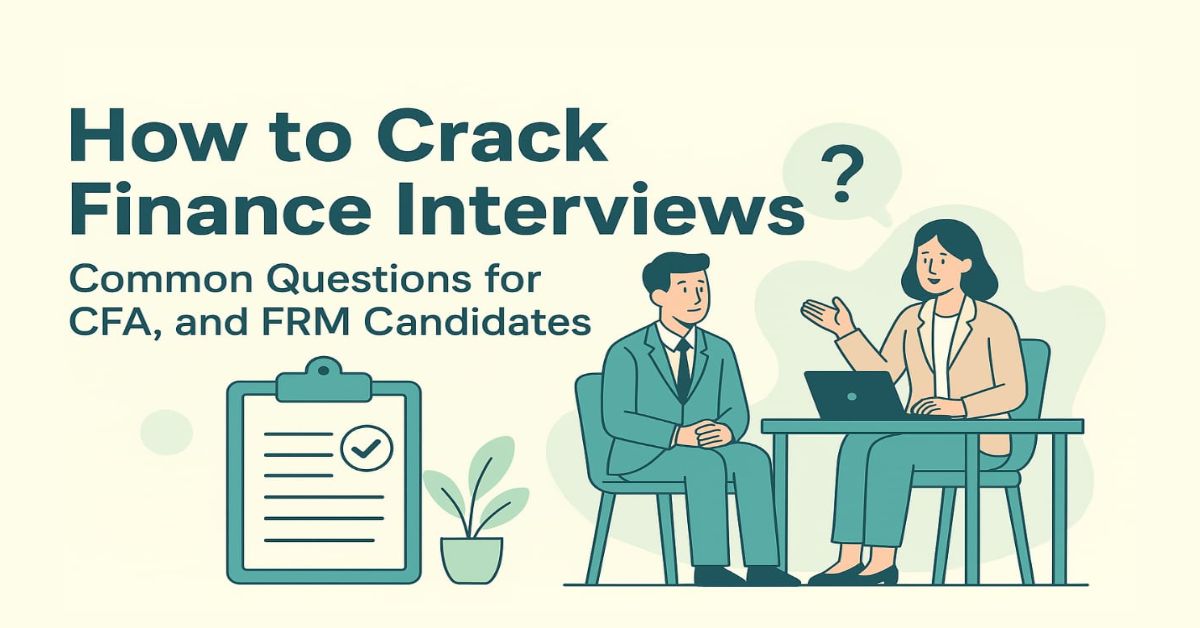
Blog
How to Crack Finance Interviews: Common Questions for CFA & FRM Candidates

Finance interviews are competitive and often intimidating, especially for CFA and FRM candidates aiming for investment banking, risk management, or financial analyst roles. If you’re preparing, the key is to expect common finance interview questions for CFA FRM candidates and practice your responses in advance. This guide breaks down the typical questions, strategies to answer them, and practical tips to help you stand out.
Why Finance Interviews Are Challenging
Finance recruiters test both technical expertise and behavioural skills. They want to know if you can apply CFA/FRM knowledge under pressure, communicate clearly, and fit into fast-paced teams. Interviews are designed to evaluate:
- Your understanding of core finance concepts.
- Your ability to analyse risk and valuation.
- How you handle problem-solving and stress.
- Whether you can present insights in a structured, confident manner.
Technical Finance Interview Questions (CFA & FRM Focus)
Core CFA Interview Questions
If you’re a CFA candidate, expect questions around:
- Valuation methods: “How would you value a company with negative earnings?”
- Financial ratios: “Which ratios are most important for analysing banking stocks?”
- Portfolio management: “How do you assess risk-adjusted returns?”
- Ethics & standards: “Tell us about a situation where ethics could impact investment decisions.”
Tip: Grounding your answers in the CFA curriculum shows you can apply theory to practical business cases.
Core FRM Interview Questions
FRM interviews typically probe risk assessment and market knowledge:
- Risk models: “What are the limitations of Value at Risk (VaR)?”
- Credit risk: “How would you evaluate a borrower’s creditworthiness?”
- Market scenarios: “What risks would rising interest rates pose to a portfolio?”
- Regulatory frameworks: “What role does Basel III play in modern banking?”
Behavioural Finance Interview Questions
Beyond technical ability, interviewers want to see if you can fit into teams and lead under pressure. Common questions include:
- “Tell me about a time you worked under tight deadlines.”
- “How do you handle disagreements in a team setting?”
- “Describe a financial project you’re most proud of.”
How to Prepare for Finance Interviews
- Master fundamentals – Revise CFA/FRM concepts and stay updated on global financial markets.
- Mock interviews – Practice answering out loud to improve confidence.
- Know the company – Research their clients, services, and recent news.
- Have questions ready – Show curiosity about the role, team, and future opportunities.
- Stay calm under pressure – Expect stress tests like mental math or rapid case analysis.
For deeper subject mastery, check out our resources:
Example Finance Interview Questions & Model Answers
Q1. How do you calculate the weighted average cost of capital (WACC)?
Ans. “WACC is calculated as the weighted average of the cost of equity and cost of debt, adjusted for the tax shield. I’d start by identifying the capital structure, estimating the cost of equity (using CAPM), and the cost of debt (from bond yields), then apply the formula.”
Q2. What’s the biggest risk facing banks today?
Ans. “Interest rate volatility and credit risk remain top concerns. With global rate hikes, banks must manage duration risk on assets and potential defaults on loans.”
Q3. Why should we hire you over other CFA/FRM candidates?
Ans. “Beyond my technical preparation, I bring practical problem-solving skills, strong communication, and the ability to simplify complex ideas, qualities that help bridge technical finance and decision-making.”
FAQs
Q1. What are the most common finance interview questions for CFA and FRM candidates?
Ans. They include valuation methods, risk management techniques, portfolio analysis, financial ratios, and behavioural fit questions.
Q2. How should I prepare for a CFA interview?
Ans. Review CFA curriculum areas (ethics, equity valuation, and portfolio management) and practice real-world applications.
Q3. How should I prepare for an FRM interview?
Ans. Focus on risk modelling, credit risk, and regulatory frameworks, and stay updated with financial market developments.
Q4. Are technical or behavioural questions more important?
Ans. Both matter: technical proves competence, while behavioural shows if you’ll succeed in a team.
Q5. What’s the best way to stand out in a finance interview?
Ans. Show structured thinking, confidence, and connect technical answers to practical market situations.
